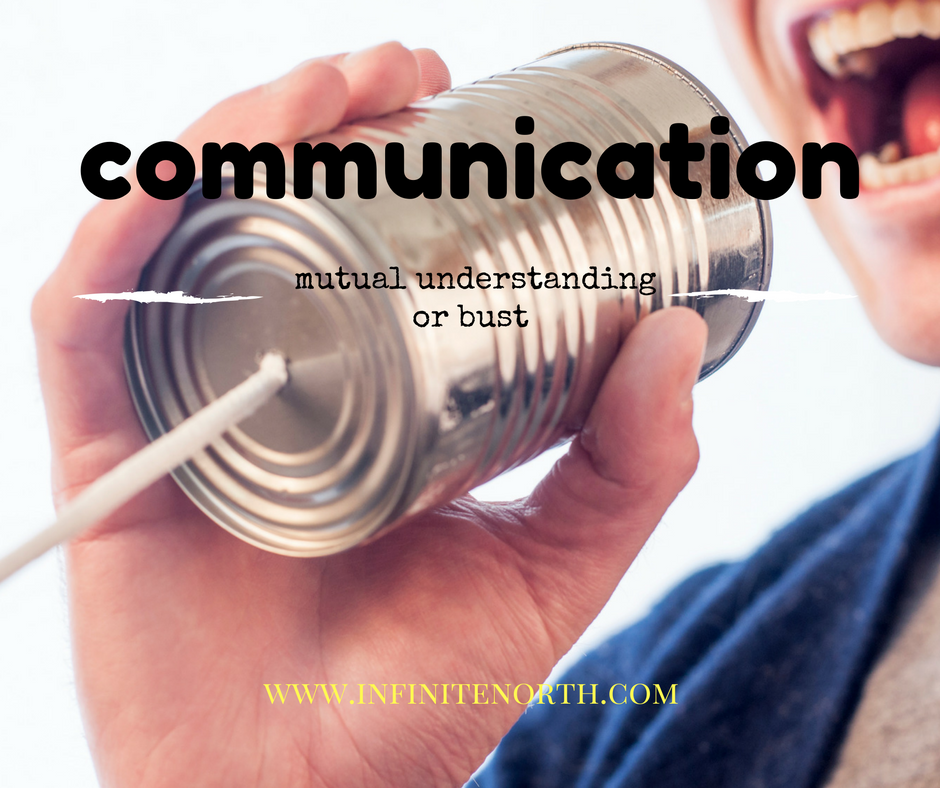In nearly every relationship, there comes a time when we feel desperate to be understood. Those are also the moments when it can be the hardest to communicate. If we shift our definition of communication slightly, we can increase our odds of being understood.
Rather than defining communication as how/what we say, let’s define effective communication as an interaction culminating in mutual understanding. Using this definition, the “right way” to communicate becomes fluid and requires flexibility. It also makes every interaction a team-effort. There’s no one way to ensure understanding. Genuine communication requires an investment in both sides of the dialogue – speaking and using nonverbal cues as well as actively listening for content and tone. If all parties are working toward mutual understanding, they’ll be flexible with how they communicate and they’ll be participating as a listener in order to clarify meaning.
In an effort to communicate effectively, we start with three simple questions. What emotion do I feel? What specific experience triggered that emotion? What (if anything) do I hope changes because of this communication?
The person initiating the conversation can set the team up for success by prepping the team for the conversation. Preparation may be as simple as, “I want to share something with you, and I’d really like you to understand where I’m coming from.” Then, dive in using this structure to convey the answers to the three questions listed above:
I feel __________ when ____________.
In the future, I would appreciate __________________.
If feel hurt when I expect you home at 6pm and you don’t get home until 8pm. In the future, I’d really appreciate that you let me know as soon as possible when your schedule changes, and it would mean a lot to me if you acknowledge how hard it is for me when I don’t know your schedule.
It’s important to start with “I feel” and follow it up with an emotion. A common mistake in this form of communication is to hide attacks within this structure. “I feel like you’re doing everything wrong” is not an appropriate use of the structure. The first blank can be filled with an emotion word, the second blank with a specific complaint, and the third blank with detailed and realistic expectations or desires.
The person listen then reflects what they’ve heard:
I hear that you feel __________ when ___________.
Moving forward, you would like ________________________. Do you feel heard?
I hear that you feel hurt when you expect me home at 6pm and I don’t get in until 8pm. It would mean a lot to you if I let you know sooner when my schedule changes…and it would mean a lot if I acknowledge how hard it must be to never know exactly when I’m going to be home. Am I hearing you?
Note the lack of defensiveness. It’s a simple reflection.
There may be a temptation at this point to shift to old habits of unhealthy conflict. The person communicating the complaint may feel penance hasn’t been served or the level of guilt isn’t adequate. They may want to start piling on more complaints or escalate into criticism. The recipient of the complaint may drift into defensiveness through excuse-making or blaming. RESIST THE URGE.
When mutual understanding has been reached – celebrate.
Thanks for hearing me out. I’m glad you just listened.
I really appreciate that you just listened without getting defensive.
I recognize it’s a problem, and I’m glad you brought it up. It’s definitely something I want to work on.
I’m glad you told me how you feel about this
Initially, this structure may feel forced and clunky. That’s okay. It doesn’t mean it’s not working. If the skill of effective communication were compared to hitting a baseball, this structure becomes the tee in tee-ball. Once you’ve got that feel of it, you can start swinging at some slow pitches. Eventually, you’ll be ready for the full-speed pitches, making adjustment mid-swing, and getting consistent contact with the ball.
For more strategies aimed at keep communication civil and productive, check these out: How to Avoid Drama, Cycle of Collusion, and be on the look out for an upcoming blog on the Four Horsemen of the Communication Apocalypse based on the work of Dr. John Gottman.


